UN Chief Urges 'Maximum Restraint' By Iran
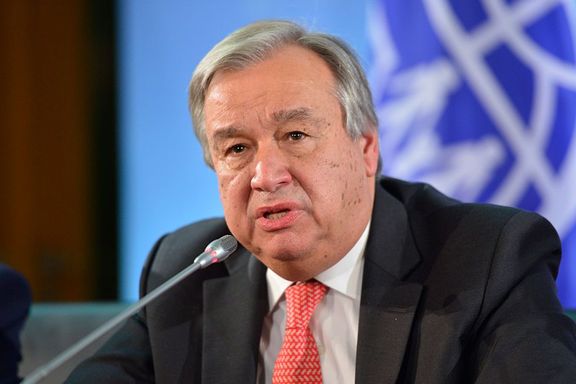
United Nations Secretary-General Antonio Guterres urged the urgent de-escalation in the Middle East in a call with the Iranian foreign minister on Tuesday, urging "maximum restraint".

United Nations Secretary-General Antonio Guterres urged the urgent de-escalation in the Middle East in a call with the Iranian foreign minister on Tuesday, urging "maximum restraint".
"The secretary general's position is one he stated very clearly on Sunday in his call for maximum restraint," said Stephane Dujarric, spokesperson for the Secretary-General, during a press briefing. "We do not want to see another cycle of eye for an eye, which is not a policy that will lead to peace."
The aerial assault followed an alleged Israeli air strike on the Iranian consulate earlier this month in which a senior Quds Force commanders was killed along with several IRGC personnel.
Dujarric added that on Monday, Guterres also was in touch with Israeli President Isaac Herzog and other Israeli officials. The Secretary-General has called for de-escalating tension and reorienting efforts on the peace front in the region.
The Israeli military said 99 percent of the aerial threats were intercepted by an operation with a US-led coalition of partners.
Israel has also expressed its intention to retaliate against the assault, which its military chief was too severe to leave unanswered. "Iran will face the consequences for its actions", said Hertzl Halevi, chief of the general staff, earlier this week.
The UN's calls also come amid criticism that the body has allowed Iran to chair its disarmament conference, while Iran not only bombards Israel and funds terror proxies across the Middle East and beyond, but also supplies drones to Russia in its offensive against Ukraine.
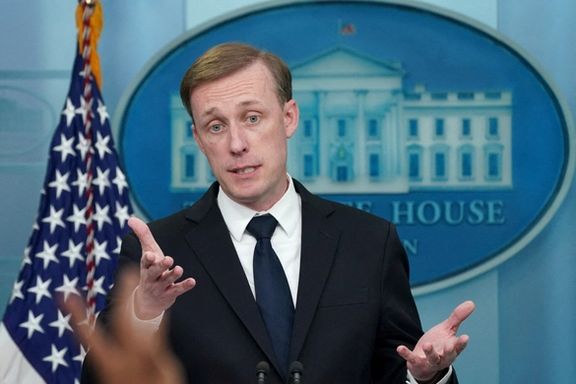
The US and the European Union plan to expand their sanctions regimes against Iran, following Tehran’s unprecedented missile and drone attack on Israel.
In the coming days, the US will impose sanctions on Iran's missile and drone programs, as well as on entities that support the Islamic Revolutionary Guard Corps (IRGC), and the Defense Ministry, according to Jake Sullivan, the National Security Adviser at the White House.
“We anticipate that our allies and partners will soon be following with their own sanctions," said Sullivan.
The European Union’s top diplomat Josep Borrell says the bloc is preparing its sanctions in response to Tehran’s attack, after an emergency video conference of foreign ministers.
Germany, France and several EU members have publicly backed a proposal to expand the sanctions regime, seeking to curb the supply of Iranian drones to Russia to include the provision of missiles and cover deliveries to Iranian proxies in the Middle East, Borrell said.
Borrell said he supported the proposal and diplomats would work on it in the coming days so ministers could discuss it again at a meeting in Luxembourg on Monday.
Critics of the US response meanwhile, say Washington is refusing to snap back UN sanctions against Iran’s missile and drone program – which they argue would impose a serious cost on Tehran.
Others argued that Washington’s response is performative and avoids pressuring Tehran.
“If they keep the cash flowing to the regime, avoid snapback, and allies don’t designate the IRGC as a terrorist organization, we will know this is more of a media stunt than a pressure track,” said Foundation for Defense of Democracies Senior Adviser Richard Goldberg on X.
IRGC Terrorist Designation
While Borrell mentioned that some EU members raised the prospect of sanctioning Iran's elite paramilitary, the Islamic Revolutionary Guard Corps, he reiterated the EU's position that the IRGC could only be designated as a terrorist organization if an EU national authority found that the group had engaged in terrorist activities.
This, however, widely disputed by numerous experts who say that there is no shortage of evidence, admissible under the EU’s process, to designate the IRGC as a terrorist group.
Borrell said the EU was not aware of any such case, but he would ask the EU's diplomatic service to examine the matter again.
This has been Borrell’s position since calls grew louder in 2022 and 2023, amid the IRGC’s brutal crackdown on anti-regime protests in Iran – killing at least 500 protesters, including children.
The IRGC’s role in sending weapons to Russia for its illegal invasion of Ukraine has also been cited by experts, as another reason to proscribe the paramilitary entity.
While the Iranian authorities targeting of dissidents and opponents abroad has been occurring for decades, recently, Tehran has also been taking aim at Jews in Europe.
In December, a German-Iranian man was sentenced by a German court to nearly three years in jail for attempting to firebomb a synagogue in the city of Bochum on behalf of the Iranian government in November 2022.
In addition, there have been foiled assassination attempts on UK-based Iranian journalists.
UK Prime Minister Rishi Sunak is facing cross-party pressure to proscribe the IRGC, after Tehran’s attack on Israel over the weekend.
Canadian Prime Minister Trudeau is similarly being urged to follow through with his 2018 commitment to vote in support of listing the IRGC. In January, marking the four-year anniversary of the IRGC's shootdown of Flight PS752, Trudeau stated that his government was exploring ways to designate the Guards.
Iran’s Ability To Export Oil
This week US Treasury Secretary Janet Yellen hinted at new sanctions against individuals and networks financing terrorism and supplying arms, rather than enforcing existing US oil export sanctions.
When asked about Iran's continuing oil exports despite US sanctions, Yellen replied, "We have been working to diminish Iran's ability to export oil...There may be more that we can do."
Iran sells around 1.3 million barrels of crude oil daily – mainly to China.
Borrell meanwhile said all the ministers from the 27-nation EU strongly condemned the Iranian attack and reaffirmed their commitment to Israel's security.
The diplomat also voiced strong criticism of Israel's conduct of the war in Gaza, launched in response to the Hamas attack on Israel from the Palestinian enclave on October 7 last year.
"Today, ministers took a strong stance, asking all actors in the region to move away from the abyss, in order not to fall into it," Borrell told reporters after the meeting, called to discuss the repercussions of the Iranian attack.
Borrell warned that the Middle East would be in "full war" if every development in the current crisis is followed by an escalation.

In a recent off-the-record meeting, US Secretary of State Antony Blinken told American Jewish leaders Israel's response to Iran's Saturday night aerial bombardment should be "limited".
According to Axios, quoting a person who attended the meeting, Blinken said that escalating the conflict between Israel and Iran serves neither Washington nor Jerusalem's interests, and advised that any Israeli response to Iranian aggressions should be "smart, strategic, and as limited as possible."
The guidance follows reports of President Joe Biden assuring Israeli Prime Minister Benjamin Netanyahu that while the US will defend Israel from attacks, it will not support or engage in an Israeli attack on Iran.Biden has long been branded soft on Iran. During his tenure, Iran has accelerated its nuclear program, sold drones to Russia for its war on Ukraine, and embarked upon a nationwide crackdown on human rights. Hundreds were executed last year amid the worst uprising against the government since the founding of the Islamic Republic.
Over the weekend, Iran initiated an unprecedented attack on Israel, launching over 350 drones, ballistic missiles, and cruise missiles. This marked the first attack of its kind by Iran. The assault was expected as it followed Iran's promise to retaliate against Israel for an air strike on the Iranian consulate in Damascus on April 1 which killed two Quds Force commanders and several IRGC personnel.
The defensive operation saw Israel joined by the US, UK, Jordan and France in a night in which 99 percent of the onslaught was intercepted.
The meeting with Jewish leaders from across the US also touched on the role of Hamas in the ongoing tensions. Blinken said Hamas declined the latest hostage deal offer, anticipating that the recent Iranian strike would trigger a wider conflict. However, with a larger regional escalation now seeming unlikely, Hamas might feel pressured to reconsider negotiations.
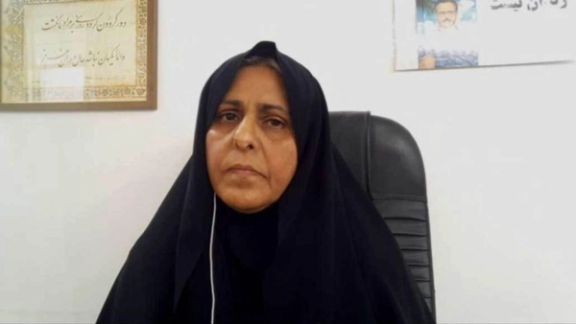
Fatemeh Sepehri, an Iranian political prisoner and outspoken critic of Supreme Leader Ali Khamenei, has been subjected to psychological torture by a judiciary psychiatrist.
Fatemeh Sepehari's brother says that Iran's judicial authorities organized a virtual meeting in Mashhad's Vakilabad prison with the presence of a "psychological interrogator", who asked her questions about her childhood.
Emphasizing that "this person refused to tell my sister his name", Asghar Sepehri wrote on X: “She is in an abysmal mental state after the session”.
The political prisoner has been imprisoned since September 21, 2022 during the Women, Life, Freedom protests. Despite her illness and several operations, including open heart surgery, she remains in confinement.
Sepehri faces severe charges, including "collaboration with hostile countries" resulting in a ten-year sentence, "conspiracy and collusion" resulting in five years of imprisonment, "insulting the leadership" resulting in two years of imprisonment, and "propaganda against the system" resulting in one year of imprisonment.
Earlier in April the judiciary opened a new case for her with the charge of "supporting Israel" after she condemned the atrocities committed by Iran-backed Hamas on October 7 which triggered a proxy war in the region.
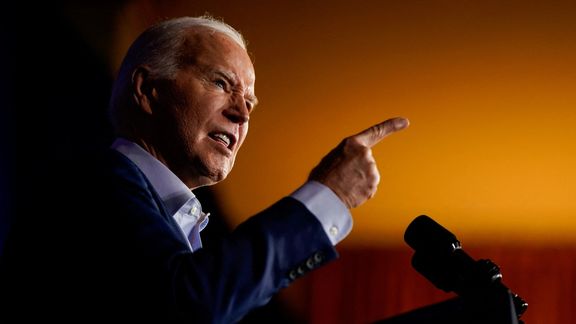
President Joe Biden wishes Israel not to retaliate against the Islamic Republic of Iran’s attempt to attack with 351 drones and missiles. Although the strike largely failed, it set a dangerous precedent.
In line with Biden, many of Israel’s western allies are pressuring Israel not to respond. Everyone is concerned about the breakout of an all-out regional war in the Middle East, and since the attack catastrophically failed, many argue that there is no reason to escalate.
While Israel has declared its intent to “hit back” at Iran, Biden, has declared the US would not participate in any Israeli attack against Iran, while stressing the US’s “Iron Clad” commitment to defend Israel. The last time a US president warned Israel not to attack an adversary, was during the presence of an existential threat in 1967.
Many in the West argue that the Iranian regime only wished to deliver “a message” to Israel, and save face in the eyes of its regional proxies and domestic audience, and thus argue for Biden’s stance from a different angle. To blame Israel for its “escalatory” tendencies on account of its insecurities whilst declaiming the merits of Iran’s vehement, albeit failed, “retaliation” as grand scale messaging distracts from a global culprit.
Biden’s appeasement policy, billed as “de-escalation” and “containment”, has failed to act as an effective deterrence and critics say the US administration can no longer shrink from its own responsibility with regards to Israel-Iran Proxies entering a phase of “Open Conflict.”
Biden’s continued efforts at “containing” the Iranian regime is informed by domestic economic concerns, namely, skyrocketing oil prices, if the Middle East is plunged into a region wide conflict. Correspondingly, Biden is concerned with his own ongoing unpopularity amongst the independent voters as well as amongst the critical Arab-Muslim voting bloc in bellwether states like Michigan. However, long before any such consideration becomes an important part of any “re-election” calculus, the Biden administration’s propensity to “de-escalation”, read “appeasement”, was its Achilles heel that was exploited by Iran and its proxies.
Since assuming the presidency, Joe Biden’s foreign policy has been marred with adopting policy options that have at once emboldened the adversaries of the US and its allies and provoked uncertainty and insecurity amongst many US partners globally. Biden’s disastrous withdrawal from Afghanistan marks the first significant misstep that only emboldened various actors, from Russia to Iran, to test the limits of Biden’s “de-escalation” policy. Biden’s vision of US national security, as outlined in Biden’s National Security Strategy, prioritizes the threat Russia and China pose and seeks to proactively confront them in strategic fissure points of conflict like Ukraine and the South China Sea.
Yet, in dealing with state and non-state actors that can equally wreak havoc in the rules-based global order, namely Iran and its proxies, the Biden administration prefers to reactively apply “strategic patience” and de-escalatory measures. As I have detailed in another piece, such an approach has in fact backfired. It has only made “rogue” states like Iran and their proxies become progressively more aggressive against the United States and its allies. According to the US Congressional Research Service Brief(February 28, 2024), not only has the Biden administration systemically refrained from enforcing the secondary sanctions against Iran’s petroleum importers, but it also has sought to cajole the ever-emboldened Iranian regime through a combination of “cash incentives” and “waivers.” The administration’s justification for such behavior only seeks to reinforce its national security orthodoxy of “maximum de-escalation.” Biden’s team argue that such an approach has helped the administration to bring back home US dual citizens in the Iranian custody whilst ensuring that US would not enter direct conflict with the Iranian regime.
Nonetheless, for the Biden administration’s every conciliatory step, Khamenei’s regime strode light years in both bolstering its armed regional proxies and expanding its ambitious enrichment program. The administration’s inability to implement the many sanctions that it has imposed on Iranian proxies caused some analysts to question their purpose and efficacy in reports published only a month before Hamas 7 October attack on Israel. Just two years into Biden’s presidency, advisors of the Tehran regime argued that Iran and its proxies must pursue maximum pressure on the US and its allies in the Middle East as a matter of national, Shia, security strategy. Such a maximum pressure seeks to win the good graces of the regime’s senior security partners, namely, Russia and China. According to this vision, Russia and China may treat the Iranian Shia Imperium’s chronic escalation as a critical leverage that could distract the Euro-American alliances from conflict points in Ukraine and East Asia.
Amid all the above, it is astonishing how the Biden administration continues to claim to appreciate the Iranian regime’s forty-five-year long practice of sowing the seeds of instability in the region and at once discounts it as a threat that can be and should be contained through “de-escalation. Having squandered all its resources to build up an imperium of proxies with the express goal of “the destruction of the state of Israel”, the regime has funded them all with cash and fattened them up with the most advanced weaponry to impose upon Israel, an asymmetrical war of attrition since the 1990s.
From the Israeli point of view, there are several constants that remain unchanged with respect to the Iranian threat: as long as Israel exists, whether it does so in peace and harmony with the Palestinians or in constant war, the Islamic Republic of Iran is committed to Israel’s destruction. Israel’s fundamental rationale to retaliate is informed by the fact that Tehran’s most recent “retaliatory” attempts establishes that it is both “willing” and “able” to bring to bear this “conventional capacity” directly from its own soil upon Israel. Israel, and the world, are fully aware of the “unconventional” “nuclear” capacity that the Iranian regime has. To Israel, Biden’s pressure on Netanyahu for “restraint” is an illusory hope for “de-escalation”. Israel’s determination to respond to Iran is meant to disabuse Biden’s administration of this illusion.
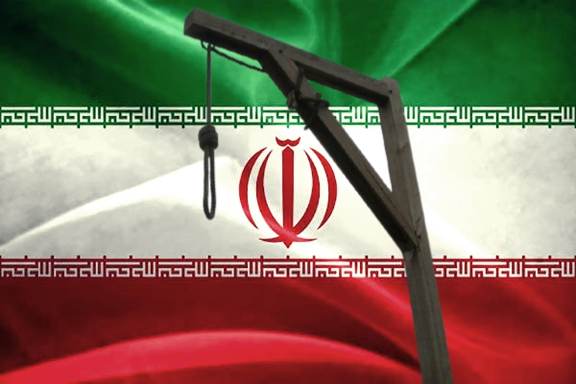
As global attention is focused on the Iranian military's attack on Israel, authorities in Iran have executed at least 9 prisoners in less than a week.
Iran, one of the leading executioners globally, has already executed nearly 1000 prisoners since 2023 – with this latest news sparking renewed concerns about the regime’s human rights record.
According to human rights organizations, between April 11 and April 15, prisoners from jails in Hamedan, Esfahan, Zanjan, and Mashhad were executed.
On Monday, 5 prisoners in Vakilabad prison in the city of Mashhad were executed on drug-related charges, according to human rights organization Haalvsh.
Prisoners Javad Beigi, Behrouz Namdar, Mostafa Abdi, and two other unnamed prisoners had been transferred to solitary confinement on Saturday ahead of their execution yesterday.
Two days ago, Arsalan Hashemi was executed in a Hamedan prison in western Iran.
According to reports by human rights organization HRNA, Hameshi was arrested and sentenced to death for drug-related offenses three years ago. His death sentence was carried out on Sunday.
Earlier this month, 82 Iranian and international human rights organizations called for joint action to stop drug-related executions, urging the United Nations Office on Drugs and Crime (UNODC) to halt its cooperation with the Iranian authorities.
HRNA also reported that a couple was executed on Sunday in the northwest of Iran, in Zanjan. Their sentences had been issued three years ago. Esmaeil Hosniani, 29, and his wife, Marjan Hajizadeh, aged 19, were executed in Zanjan Central Prison, as further confirmed by another human rights organization, Hengaw.
HRNA further reported that Hajizadeh was a victim of child marriage and was only 16 years and four months old at the time of her arrest.
On Saturday, Abu Dhar Salem, of Afghan origin, was executed in Dastgerd prison in Isfahan, Iran. Salem was 30 years old and from Pol-e-Khomri, a city in northern Afghanistan. He was arrested and sentenced to death about three years ago on murder charges.
In addition, 5 prisoners in Ghezel Hesar prison in the city of Karaj, and another prisoner in Rasht prison were transferred to solitary confinement cells over the last two days.
The transfer of prisoners with death sentences to solitary confinement aligns with the standard procedures that Iranian authorities follow before executing sentences.
According to HRNA, yesterday Nasir Jabari, a 40-year-old prisoner from Sari at Rasht Central Prison in northern Iran, was transferred to a solitary cell. Jabari was arrested three years ago on murder charges.
Yesterday, 5 unidentified prisoners arrested on murder charges were also transferred to solitary cells in preparation for executions at Ghezel Hesar prison in Karaj, Iran, according to HRNA.
The latest research by Amnesty International this month, shows a spike in executions in Iran, with at least 853 people executed in 2023 alone.
"The death penalty is abhorrent in all circumstances, but deploying it on a mass scale for drug-related offenses after grossly unfair trials before Revolutionary Courts is a grotesque abuse of power," the report said.






